A delicious semolina, coconut and yoghurt cake topped with almonds and drizzled with sugar syrup.
Basbousa is a delicious semolina, coconut, and yogurt cake topped with almonds and soaked in sugar syrup. This moist, sweet treat is popular across the Middle East and commonly found in pastry and sweet shops.
There are many regional versions of this semolina cake—it’s known as Revani in Turkey, Basbousa in Egypt and the Middle East, and Shamali in Armenia.
If you like Basbousa, you might also enjoy the Persian Love Cake — another semolina-based cake soaked in fragrant sugar syrup with a unique Persian flavor.
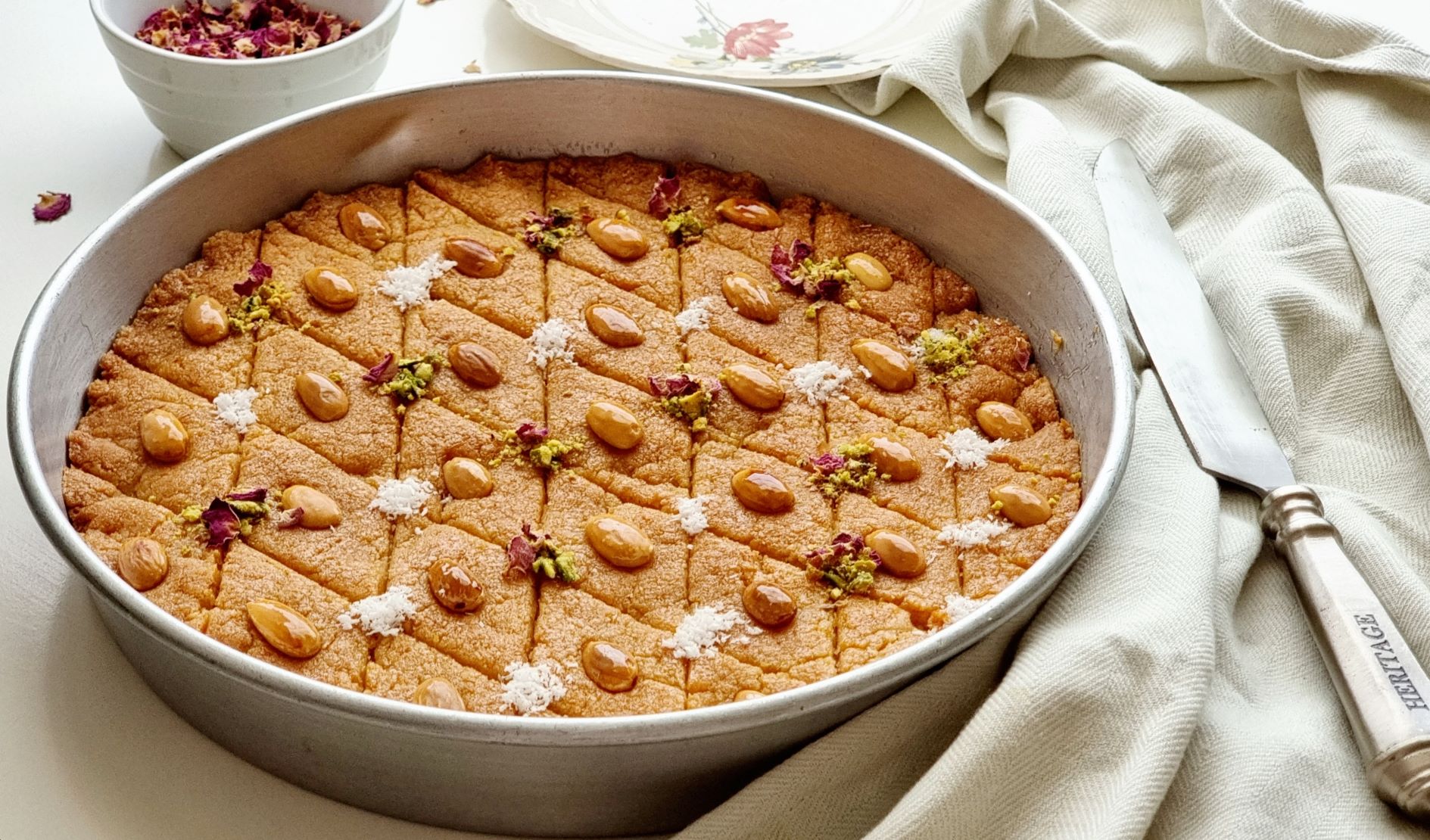
Ingredients for Basbousa
The key ingredients for this Middle Eastern semolina cake are:
- Semolina – Coarse semolina gives the cake its signature grainy texture, but fine semolina works as well.
- Desiccated Coconut – Use fine-textured coconut for the best consistency.
- Plain Flour – Also known as all-purpose flour.
- Melted Butter – You can use butter or desi ghee. Ghee adds a richer aroma, but the taste remains similar.
- Yogurt – Plain or Greek yogurt works best. It helps keep this eggless Basbousa soft and moist.
- Baking Powder – While Basbousa is dense, a small amount of baking powder gives it a gentle lift.
How to Make Basbousa
Prepare The Batter
Mix all the ingredients in a bowl until they come together into a dough-like consistency. Transfer the mixture into a greased baking dish and spread it evenly using your hands or a spatula. You can score the surface into your desired shape—traditionally, Basbousa is cut into diamond or star patterns before baking. Place a blanched almond in the center of each piece.
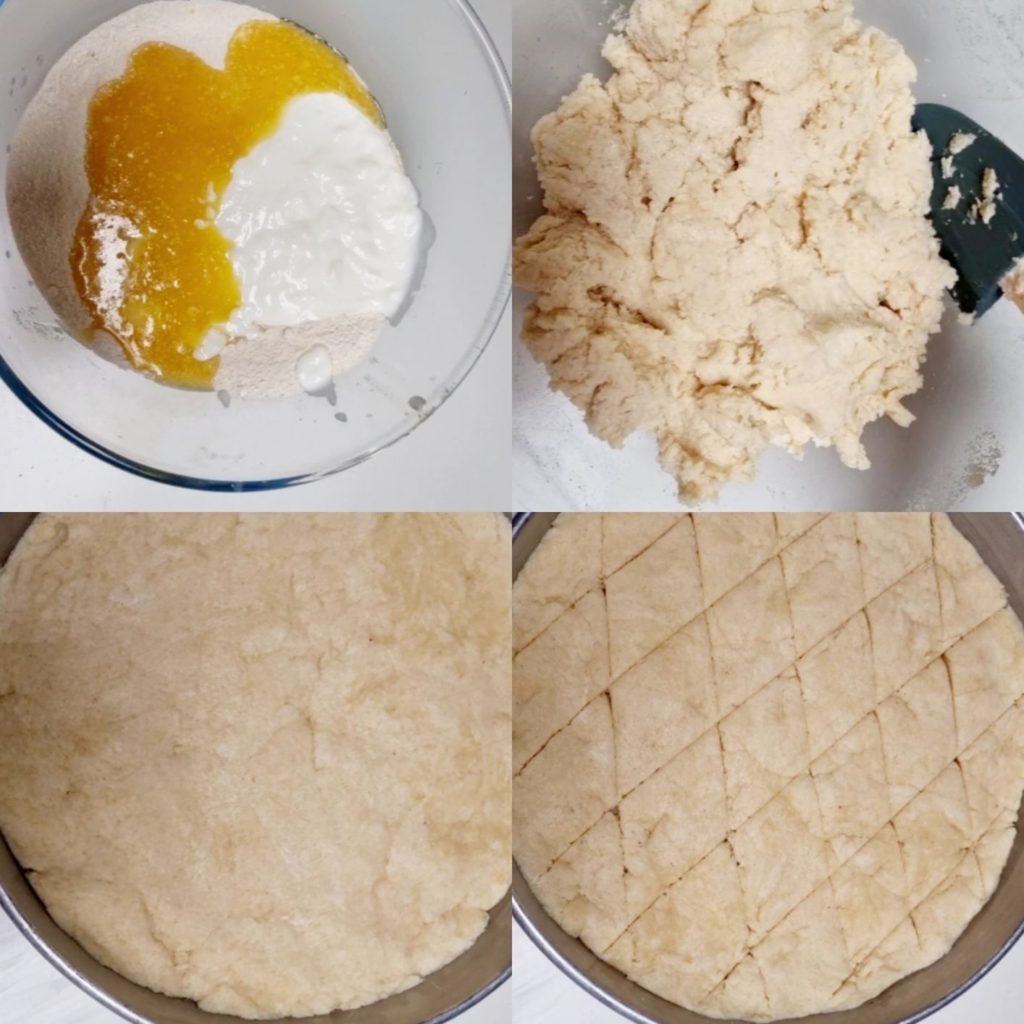
Baking Instructions:
I used a 12-inch round baking tray, which yields a Basbousa about 1.5 inches thick. Feel free to use any baking dish depending on how thick you want your semolina cake to be. Bake in a preheated oven at 180°C / 350°F on the middle rack until the edges turn golden brown. Rotate the pan as needed for even color. You can broil the top for a deeper golden crust, but be cautious—it can burn quickly.
Prepare Sugar Syrup
I used 1½ cups of sugar and 1 cup of water to make the syrup. The consistency is thin, which helps it absorb easily into the semolina cake. You can add different flavors to the syrup—lemon, orange blossom, or rose water are the most common.
For this recipe, I used lemon juice, which adds a fresh, subtle flavor to the sugar syrup. Pour the warm syrup over the hot Basbousa as soon as it comes out of the oven. Let it sit and absorb the syrup. If you have time, cover and let it soak overnight for best results—but a couple of hours is usually enough.
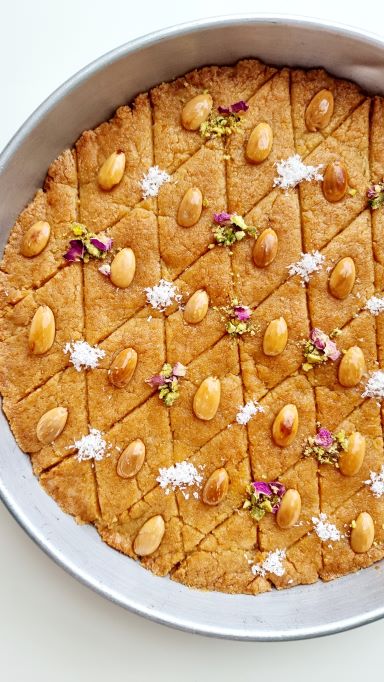
Can I bake Basbousa like a regular cake?
Basbousa isn’t light and fluffy like a traditional cake — it has a dense, grainy texture due to the semolina. However, you can bake it in a cake tin without scoring or cutting it first. Just pour the syrup after baking and slice it once it cools. Keep in mind, the texture and soakability work best in shallow trays, not deep cake pans.
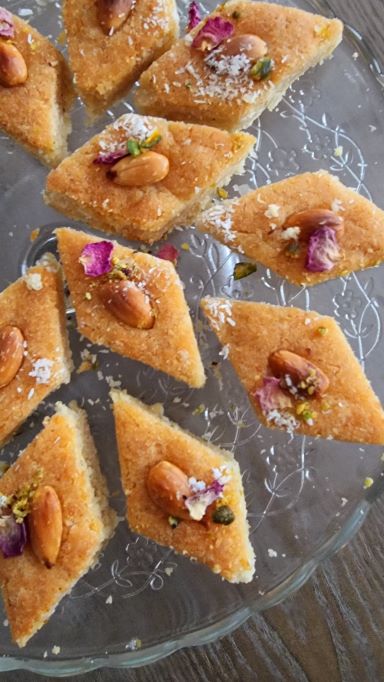
Watch How to Make Basbousa (Middle Eastern Semolina Cake)
Some Tips for Perfect Basbousa
- Score before baking: Score the cake into diamonds or squares before baking. Once it’s cooled and soaked, cut it fully. For clean slices, grease your knife or dip it in warm water.
- Hot on hot: Always pour hot syrup over hot Basbousa straight from the oven. This helps the syrup absorb evenly and keeps the cake moist.
- Don’t overbake: Bake just until the top is golden and edges pull away slightly. Overbaking will dry out the semolina and make the texture crumbly.
- Use coarse semolina for texture: If you prefer that signature grainy bite, opt for coarse semolina. Fine semolina gives a smoother, more cake-like finish.
- Let it rest: For best results, let Basbousa rest for a few hours (or overnight) after soaking. This allows the syrup to fully penetrate and enhances the flavor.
- Bake in a wide, shallow dish: A 12-inch round or rectangular tray gives ideal thickness. Avoid deep pans—they make syrup absorption harder and change the texture.
Storing Basbousa
Basbousa can be stored in an airtight container at room temperature for up to 3–4 days. In warmer weather, refrigerate it and reheat briefly in the microwave before serving to restore its soft, syrupy texture.
Other Middle Eastern Desserts to Try:
If you try this recipe, I’d love to hear from you. Drop a comment below and give me your feedback.
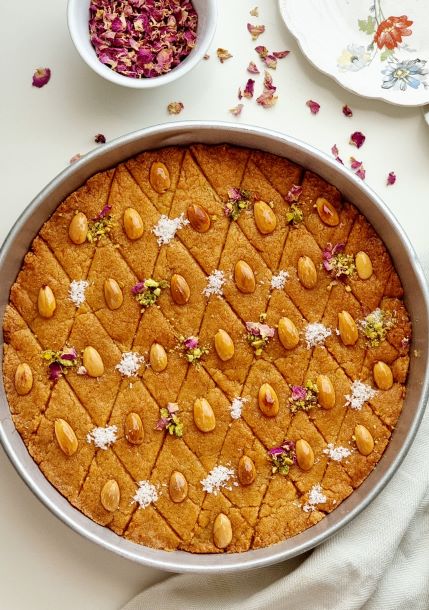
Basbousa – Semolina Cake
Ingredients
- 2½ cup Semolina See Notes
- 1 cup (90g) Desiccated Coconut
- 200 g Yoghurt See Notes
- 200 g Melted Butter See Notes
- ½ cup (75g) Plain Flour
- ½ tsp Baking Powder
- Almonds Blanched
- Pistachios Chopped ( Optional) For decoration
- Dried Rose Petal (optional) For decoration
- Desiccated Coconut For decoration
Sugar Syrup
- 1½ cup Sugar
- 1 cup Water
- 2 tbsp Lemon Juice
Instructions
- Preheat oven to 180° C/ 350 ° F.
- Grease a baking pan with butter ensuring to rub butter on sides and base of the pan.
- In a mixing bowl add semolina, plain flour, desiccated coconut and baking powder. Add yoghurt and melted butter. Mix until a dough-like mixture forms.
- Spread the mixture evenly in the pan. Press it with hands make sure is evenly distributed in the pan. You can use a spatula for make it smooth.
- Score the surface into diamond or star shapes, and place a blanched almond in the center of each piece.
- Bake for 30–40 minutes, or until golden brown on all sides.
Sugar Syrup
- Add water and sugar in a pan. Heat it on medium heat while stirring untill sugar dissolves.
- Add lemon juice and remove from the heat. Keep it warm until the cake is baking.
- Pour warm syrup over the cake straight out from the oven. Allow it to soak the syrup. If you like decorate with pistachios or rose petals and desiccated coconut.
Notes
- Semolina Texture: Coarse semolina gives the classic grainy texture. Fine semolina can be used for a smoother, softer finish.
- Butter vs Ghee: You can substitute melted butter with desi ghee for a more aromatic, traditional flavor.
- Yogurt: Full-fat plain or Greek yogurt works best. Since this is an eggless Basbousa, yogurt keeps the cake moist and helps bind the ingredients.
- The pan for basbousa should be shallow. You can use any oven proof dish as well.
- Grease the pan or dish properly, this prevents the cake from sticking to the bottom.
- Cutting the Cake: Scoring the cake before baking helps it hold shape after syrup is poured. Use a greased or warm knife to slice neatly once cooled.
- Syrup Soaking Tip: For best absorption, ensure both the cake and syrup are warm. Let the cake rest for a few hours (or overnight) before serving.
- Garnish Options: In addition to blanched almonds, you can top with chopped pistachios, rose petals, or a sprinkle of desiccated coconut for extra flavor and presentation.

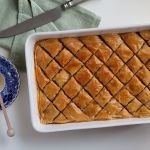
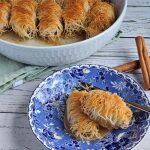
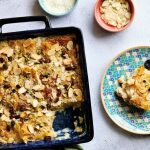
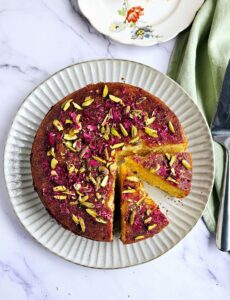
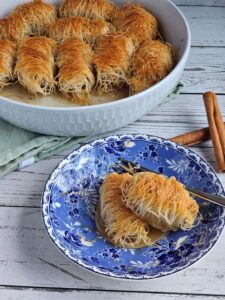


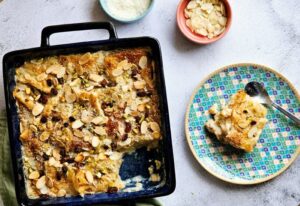

Thank you for sharing 😘
I made this and it turned out perfect. I added bit of rose water in sugar syrup, it adds nice flavour and aroma.